The Mainstream Phoenix Rises: Samsung's 970 EVO (500GB & 1TB) SSDs Reviewed
by Billy Tallis on April 24, 2018 10:00 AM ESTAnandTech Storage Bench - The Destroyer
The Destroyer is an extremely long test replicating the access patterns of very IO-intensive desktop usage. A detailed breakdown can be found in this article. Like real-world usage, the drives do get the occasional break that allows for some background garbage collection and flushing caches, but those idle times are limited to 25ms so that it doesn't take all week to run the test. These AnandTech Storage Bench (ATSB) tests do not involve running the actual applications that generated the workloads, so the scores are relatively insensitive to changes in CPU performance and RAM from our new testbed, but the jump to a newer version of Windows and the newer storage drivers can have an impact.
We quantify performance on this test by reporting the drive's average data throughput, the average latency of the I/O operations, and the total energy used by the drive over the course of the test.
The Blue lines indicate the PM981, the OEM version of the 970 EVO.
The Orange lines are the 970 EVO.
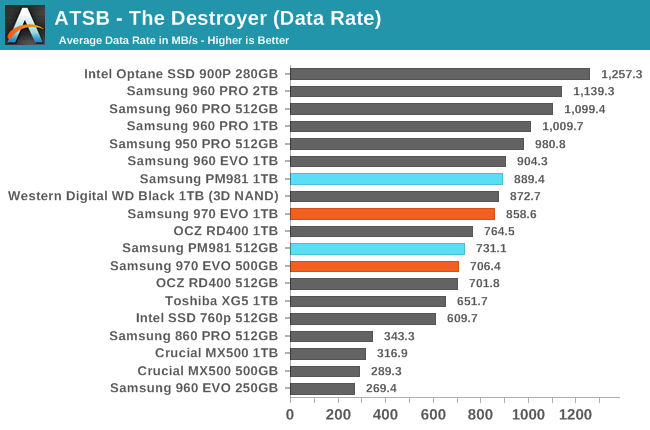
The average data rates from the Samsung 970 EVO on The Destroyer are a slight step backwards from the Samsung PM981 OEM drive and from the 960 EVO. All of the TLC-based drives are still performing below even Samsung's older MLC-based NVMe drives, and of course the Intel Optane SSD. This year's Western Digital WD Black offers about the same performance as the 970 EVO.
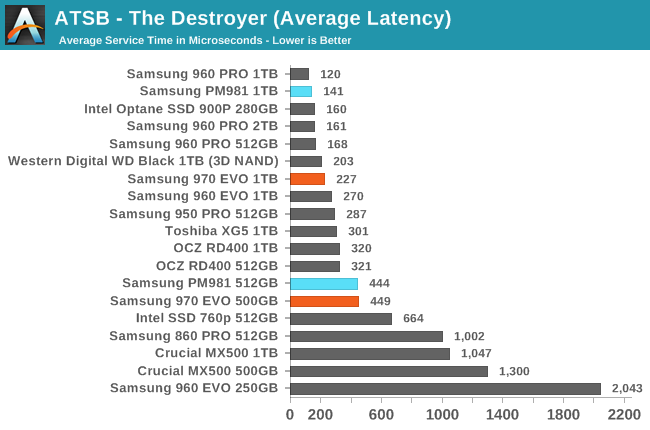
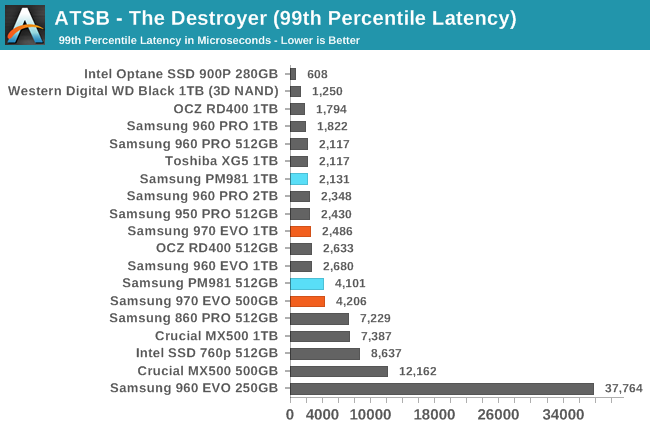
Average and 99th percentile latencies for the 970 EVO are again very slightly worse than the PM981, but on these metrics the 960 EVO doesn't beat its replacement. The WD Black has notably better 99th percentile latency than the other flash-based SSDs.
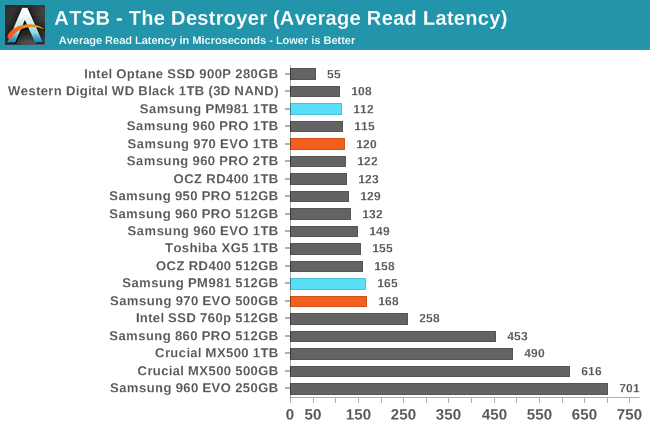
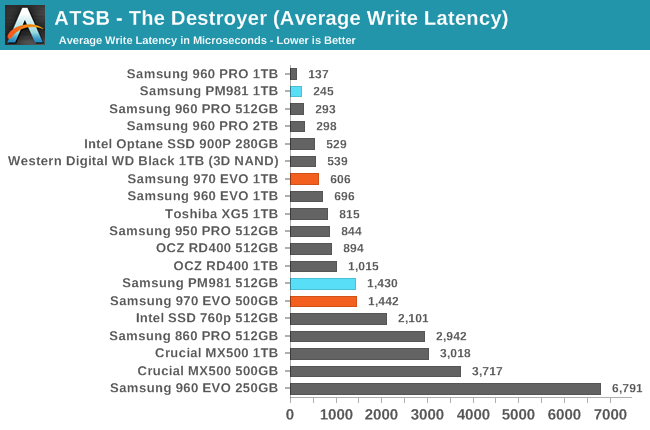
There is a clear range of average read latency scores that make up the high-end NVMe market segment. The 970 EVO doesn't stand out from the other drives in that category. For average write latency, scores vary a lot more, and the 970 EVO outperforms its predecessor slightly but fails to match the very good score the PM981 obtained.
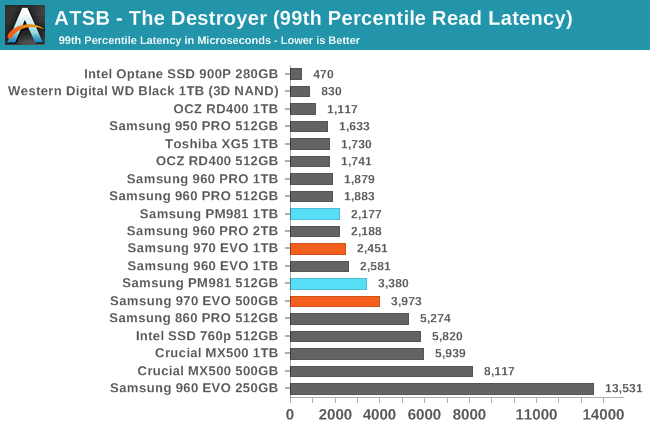
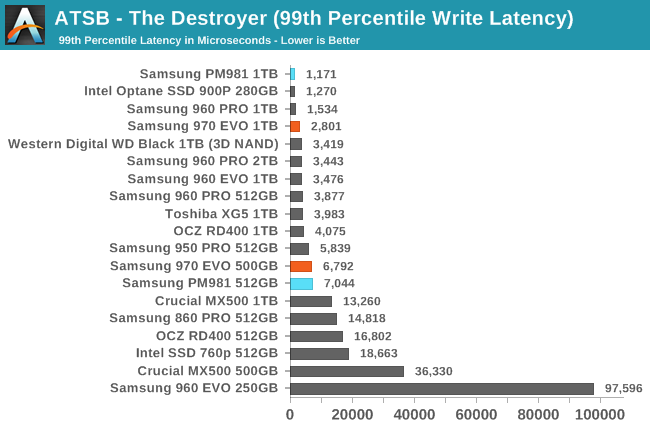
The 99th percentile read and write latency scores from the 970 EVO don't break new ground and mostly fail to match the PM981, though the differences aren't large enough to be a serious concern. The WD Black's notable QoS advantage is on the read side, where it is the only flash-based SSD to almost always keep read latency below 1ms.
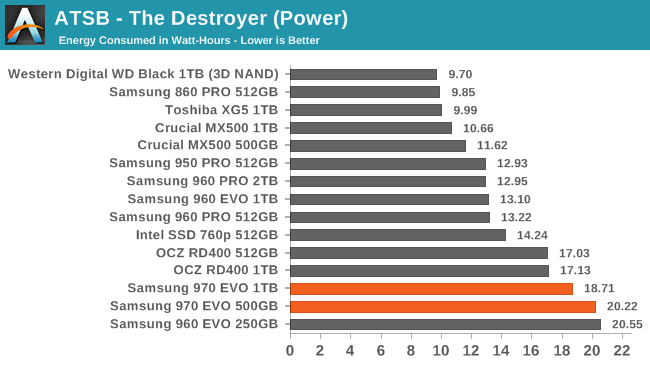
We didn't have the opportunity to measure power usage of the Samsung PM981 on The Destroyer, so this is our first look at the power draw of the Samsung Phoenix controller on this test. The situation isn't good. The 970 EVO uses twice the energy as the WD Black to does despite both drives offering about the same level of performance on The Destroyer. The power efficiency of the 970 EVO seems to be a big step backwards from the previous generation and is not at all competitive.










68 Comments
View All Comments
qlum - Tuesday, October 16, 2018 - link
Just as a reminder how the argument against the ssd can change overtime:Right now the prices at least here in the netherlands are as follows:
Crucial MX500 (SATA) €160
HP EX920 (NVMe PCIe x4) €287
Intel 760p (NVMe PCIe x4 ) €289
WD Black (NVMe PCIe x4) €312
Samsung 970 EVO (NVMe PCIe x4) €269
Samsung 960 PRO €374
Suddenly the 970 evo is the cheapest of the bunch this makes its value a lot better
Of course there are still cheaper nvme ssds such as the intel 660p but at the tb mark its one of the cheapest nvme ssd's
modeonoff - Tuesday, April 24, 2018 - link
Isn't nvme m.2 SSD performance affected by Meltdown/Spectre patches?Billy Tallis - Tuesday, April 24, 2018 - link
Yes, because storage benchmarks make system calls more frequently than almost anything else. Once the updates have been applied to the testbed, I'll be re-testing everything for future reviews. This will take a while, so I've waited until I have several reviews worth of testing completed that can fill the gap before I have new results for a new drive and the older drives it needs to be compared against.My preliminary tests of the impact of the patches show that while the scores themselves are affected, the rankings of drives aren't, so the current measurements are still useful for judging which drives are best.
Reppiks - Tuesday, April 24, 2018 - link
Could be nice to see AMD vs Intel post patches as it shouldn't affect AMD as much?Infy2 - Tuesday, April 24, 2018 - link
Nvme and Sata controllers are made by AsMedia on AMD's AM4 mother boards. Sadly they are somewhat slower than Intel's controllers. Even after Spectre and Meltdown patches Intel is still king of storage performance.Tamz_msc - Tuesday, April 24, 2018 - link
Ryzen CPUs have a dedicated PCI-E x4 link for nvme drives which bypasses the chipset.bernstein - Tuesday, April 24, 2018 - link
nvme is just PCIe x4 + software... that's why a passive pcie x4 to m.2 works. and why a nvme m.2 ssd should work with reduced speed over PCIe x1 or PCIe x2. the same goes for PCIe 2.0 links... combine these and you get a working passive mPCIe to M.2 adapter.willis936 - Tuesday, April 24, 2018 - link
NVMe controllers are made by Intel, AMD, and Microsoft (and whatever analog set of companies for mobile) because it's just a software stack that runs on CPUs.Kwarkon - Wednesday, April 25, 2018 - link
Close but not exactly. You mean drivers.HStewart - Tuesday, April 24, 2018 - link
I personally think people are making a bigger deal of this Methdown/Spectre stuff than it worth it.Yes performance is one area - but there are other reasons why people purchase a product.
Especially in heavy graphics or in this case storage usage - these patches should not have no minimal effect.
To the average customer - the effect is not notice - how much will they notice a 5% or leas slow down in cpu speed. But change a hard drive to one of these SSD's would be a significant improvement